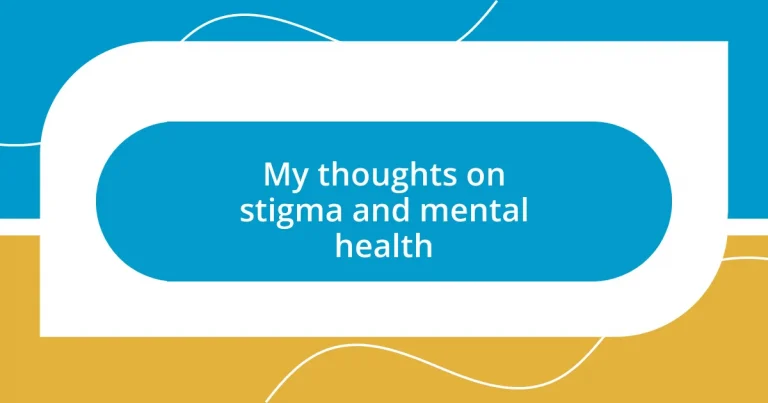Key takeaways:
- Stigma around mental health often stems from misunderstanding, leading to social isolation and hindering individuals from seeking help.
- Open conversations and sharing personal experiences can dismantle stigma and foster connections, reinforcing the importance of supportive environments.
- Education and advocacy are crucial in promoting mental health awareness, as informed discussions can change perceptions and encourage openness.
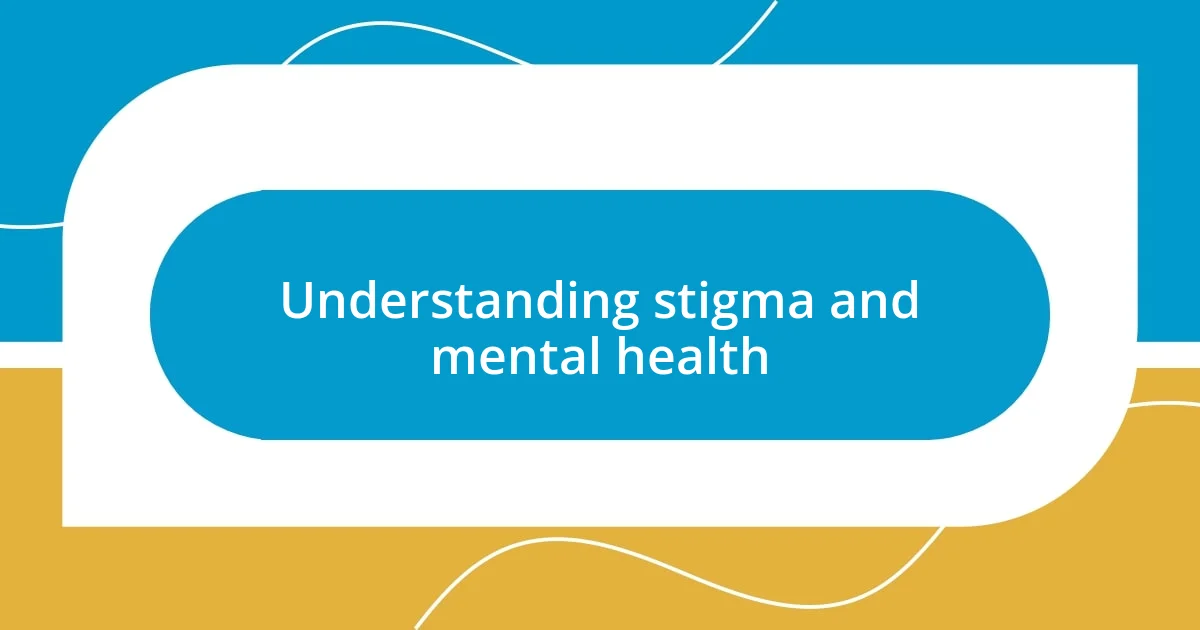
Understanding stigma and mental health
Stigma around mental health often grows from a lack of understanding. I remember a time when I shared with a friend that I was feeling anxious; instead of offering support, they brushed it off as just “stress.” It made me wonder, how can we expect people to be empathetic if they haven’t walked in those shoes themselves?
The weight of stigma can be crippling, often silencing those who need to speak up. Personally, I’ve felt that hesitation when discussing my own experiences with mental health. It’s heartbreaking to think that so many might choose isolation over connection out of fear of judgment. Isn’t it ironic that the very struggle for help can become the reason individuals feel even more alone?
When we talk about mental health, it’s crucial to unpack the misconceptions and biases that fuel stigma. I often find myself questioning why we view mental illness as a flaw, rather than just another aspect of being human. By shifting our perspective and acknowledging that everyone has battles, we invite a culture of openness and healing.
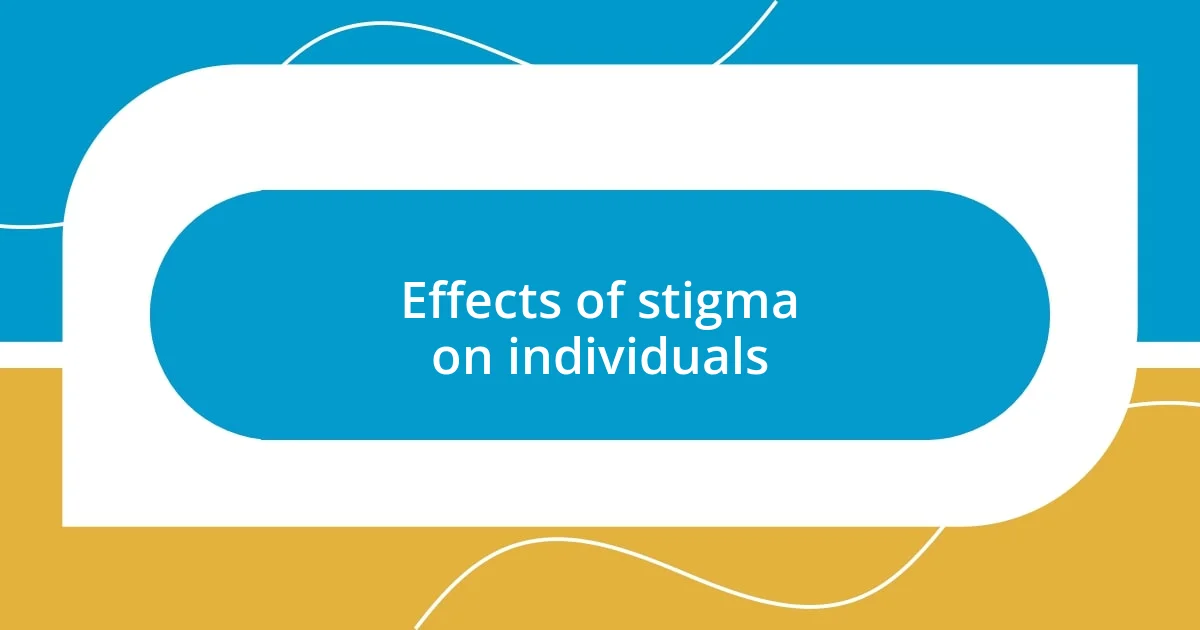
Effects of stigma on individuals
The effects of stigma on individuals can be profound and multifaceted. I recall a colleague who faced severe backlash after revealing their struggle with depression. The whispers behind their back and changed attitudes were palpable. This experience underscores how stigma can lead to social isolation, pushing those who need support further into the shadows.
Many people internalize stigma, believing the negative perceptions of others. I once hesitated to seek therapy because I feared what my friends would think. That fear didn’t just hold me back; it created an invisible barrier to healing and growth. This internal struggle often leads to decreased self-esteem and can worsen the very conditions individuals are attempting to manage.
The workplace is another arena where stigma manifests, often detrimentally affecting one’s career. I’ve seen talented individuals passed over for promotions, not because of their capability but due to misconceptions about their mental health challenges. These biases not only limit opportunities for those individuals but also deprive organizations of valuable contributions. It makes you wonder—how many brilliant ideas are lost because someone feels they can’t bring their whole self to work?
| Effects of Stigma | Examples |
|---|---|
| Social Isolation | Feeling excluded from friendships and social gatherings |
| Internalized Shame | Believing you’re unworthy of support due to mental health struggles |
| Career Limitations | Missed promotions or job opportunities based on misconceptions |
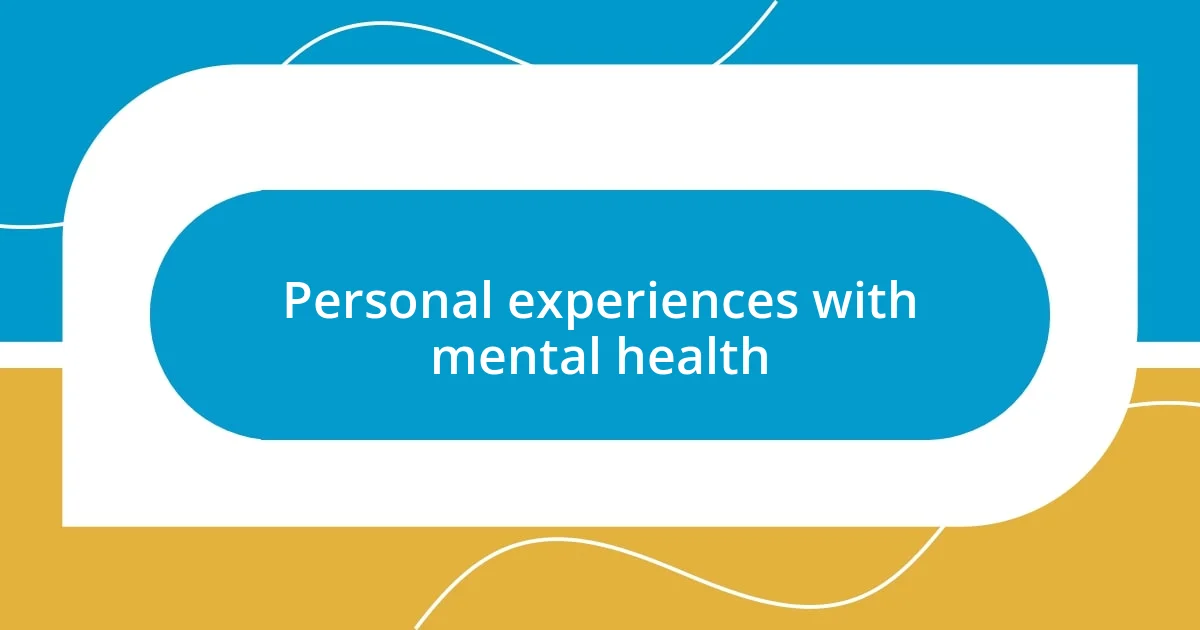
Personal experiences with mental health
I’ve had my share of ups and downs when it comes to mental health, and each experience has shaped my understanding of the stigma surrounding it. There was a moment during my college years when I openly discussed my struggles with anxiety in a small group. Instead of receiving the understanding I hoped for, a few laughed and joked about it, trivializing my pain. It was a real eye-opener, showcasing how some people dismiss serious issues without even realizing the impact of their words.
- I’ve learned that vulnerability can lead to unexpected responses, both positive and negative.
- Opening up about my mental health has sometimes felt like walking a tightrope, balancing my honesty with the fear of being judged.
- Witnessing friends who battled depression feeling silenced by society reinforced my resolve to support mental health openly.
Through my journey, I grappled with the frustration of feeling like I had to prove my struggles were valid. In a moment of revelation, I confided in a close friend about my thoughts. To my surprise, they revealed their own battle with similar feelings. It struck me how often we carry our burdens alone, worried about what others might think. That moment not only strengthened our friendship but also highlighted the sheer power of sharing our truths. It’s incredible how openness can create connections that shatter stigma, but it takes courage to step into that space.
- My experience underscores the importance of finding safe spaces to talk about mental health.
- I often reflect on how societal perceptions can distort our realities, sometimes making us question our own experiences.
- Connecting with others who share similar struggles has been one of the most significant steps in my healing process.
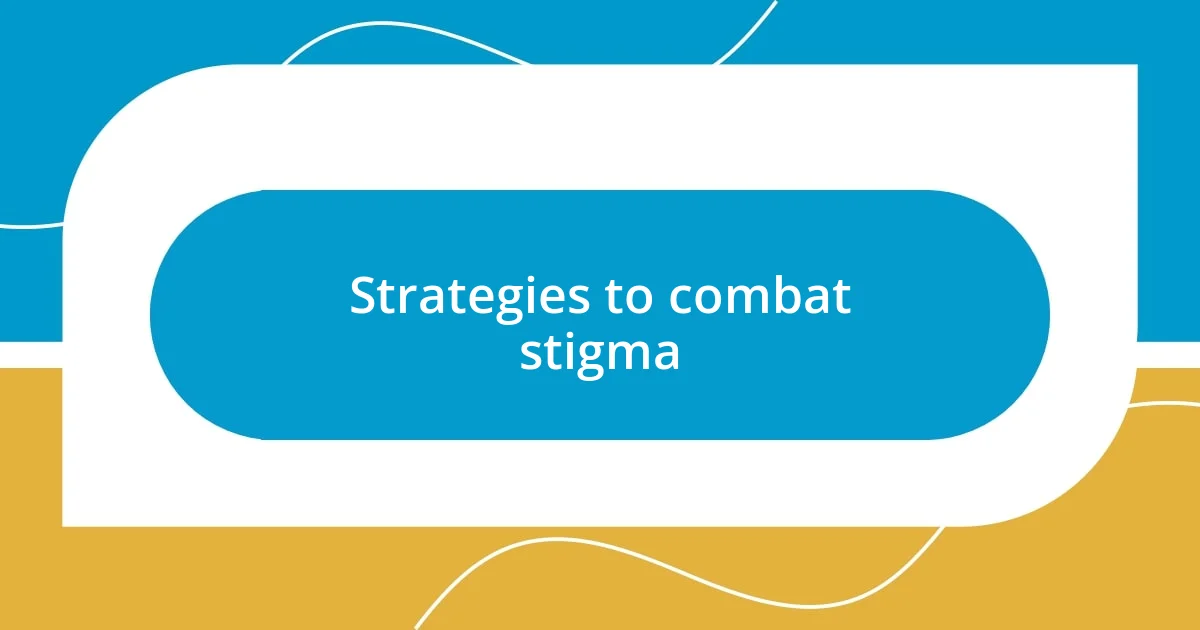
Strategies to combat stigma
One practical strategy I’ve found effective in combating stigma is fostering open conversations about mental health. I remember hosting a small gathering where we had a dedicated discussion about our emotional challenges. Initially hesitant, many of my friends eventually shared their own stories. It was a powerful moment; by shedding light on our struggles, we not only strengthened our bonds but also normalized the conversation around mental health. Isn’t it remarkable how sharing experiences can help dismantle stereotypes?
Education plays a crucial role as well. I once joined a community workshop focused on mental health awareness, and it completely shifted my perspective. Listening to experts discuss the realities of mental illness helped me understand that stigma often stems from a lack of knowledge. This insightful experience fueled my passion for advocating mental health education in schools. How often do we let stereotypes influence our beliefs simply because we are unaware?
Lastly, supporting advocacy campaigns can be a game-changer. I participated in a local event aimed at promoting mental health resources, and the collective energy was inspiring. Seeing individuals and organizations rally together sent a strong message that mental health matters. It felt empowering to be part of something larger, where everyone was dedicated to making a difference. Why wait for others to take action when we can all contribute to a more understanding world?
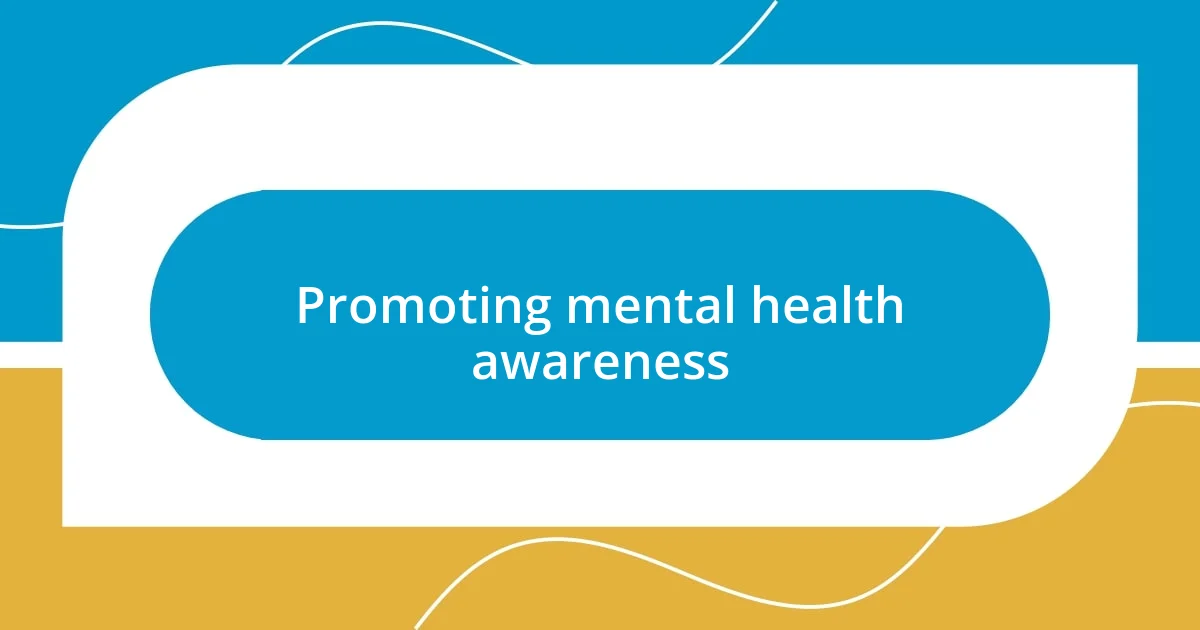
Promoting mental health awareness
Promoting mental health awareness is something I’m deeply passionate about, as I’ve seen firsthand how knowledge can transform attitudes. Recently, I volunteered at a mental health fair, where I was struck by the diversity of stories shared. People openly discussed their experiences with everything from anxiety to bipolar disorder, and it reminded me just how powerful it is to have conversations that break the silence. Have you ever felt inspired by someone’s honesty? It’s those moments that stick with us and encourage others to share their stories too.
Social media also plays a crucial role in spreading awareness. I recall a time when I shared a post about mental health resources on my platform. The response was overwhelming — friends reached out, sharing their own struggles and thanking me for starting the conversation. It made me realize how accessible information can ignite change, especially when we harness the platforms we spend so much time on. Isn’t it amazing how a simple post can create a ripple effect?
Moreover, I believe that integrating mental health education into our daily lives can make a significant difference. I once joined a book club focused on literature about mental health, and the discussions were eye-opening. Each book offered a different perspective, inviting all of us to explore our thoughts and feelings in a judgment-free zone. As we parsed through the characters’ journeys, I often wondered: what if everyone had the chance to engage with these stories? Wouldn’t we be more empathetic and understanding towards one another?
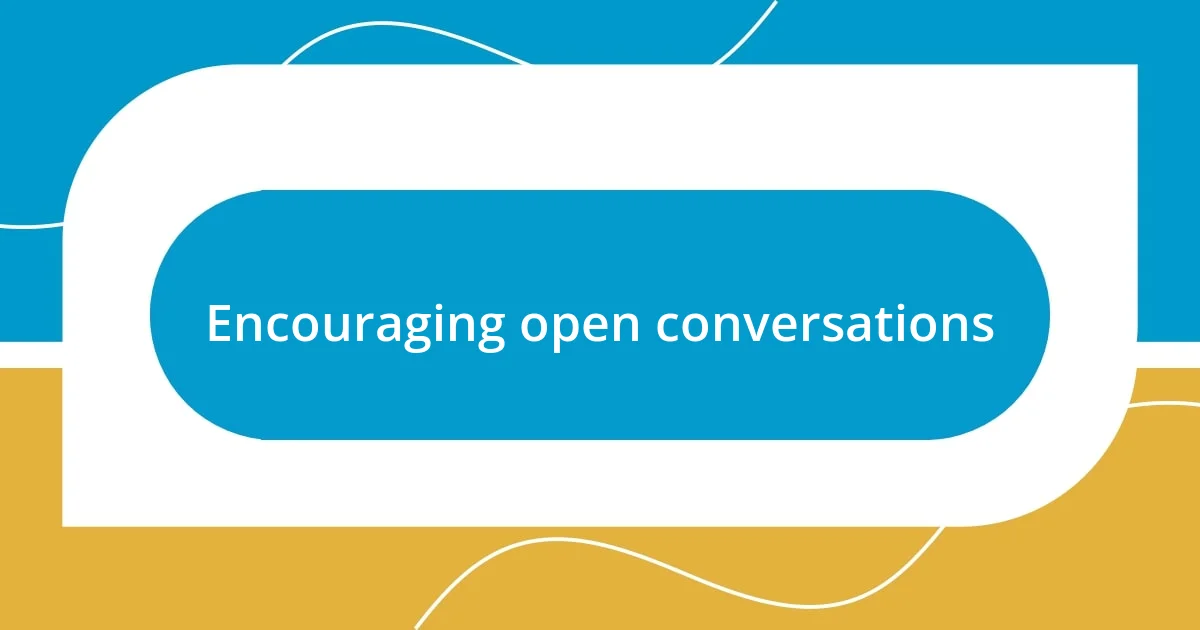
Encouraging open conversations
Encouraging open conversations can be as simple as creating a safe environment where everyone feels heard. I vividly remember an evening spent at a local coffee shop, where a few friends and I turned our casual catching up into a deeper dialogue about mental health. As we shared our experiences, I could sense the weight lifting off our shoulders. It struck me then—how often do we miss opportunities to connect on a deeper level simply because we’re afraid to start the conversation?
One impactful moment for me came during a family dinner when my cousin courageously spoke about her struggles with anxiety. The room fell silent for a moment, but instead of shying away from the topic, my family rallied around her. People began sharing their experiences too, and what started as a challenging conversation became one of understanding and support. Have you ever noticed how revealing our vulnerabilities can encourage others to do the same? It was a beautiful reminder that talking openly creates bonds that defy stigma.
I’ve also found that leveraging casual settings can foster these conversations effectively. For instance, during a hike, I opened up about my own mental health journey, and it led to a thoughtful discussion as we trekked along the trail. The beauty of nature provided the perfect backdrop that eased any tension, reminding me that sometimes, the right environment makes all the difference. Could it be that the most meaningful conversations happen when we least expect them? I think they often do. By embracing these opportunities, we can demystify mental health and encourage a culture of openness.












